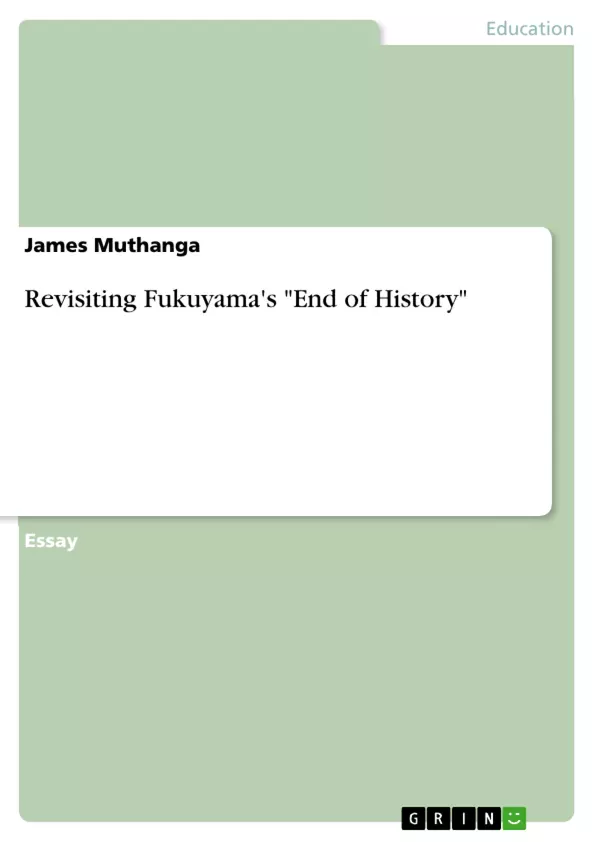Fukuyama's essay, "End of The History," later integrated into his book, "The End of History and Last Man," elicited widespread controversy and debate regarding liberal democracy. Fukuyama argued that the final phase of humanity's socio-political evolution was the victory of liberal democracy. Using the phrase "end of history," Francis Fukuyama noted that, based on his observation, the universalization of Western liberal democracy marked the end point of humanity's ideological evolution. His essay aimed to demonstrate that liberalism was ideal for governing the material world as well as the realm of ideas or consciousness. For this assignment, I will argue against Fukuyama's thesis by drawing extensively from the arguments forwarded by three other authors, including Achille Mbembe, Slavoj Žižek, and Samuel Huntington, in their works "Necropolitics,"Critique of Capitalism," and "Clash of Civilizations" respectively. A critical analysis of these works will provide a strong foundation that challenges Fukuyama's view of the end of history.
Inhaltsverzeichnis (Table of Contents)
- Revisiting Fukuyama's "End of History" Essay
- Necro-politics
- The Concept of Necro-politics
- Modernity Society
- The Marxist Theory of Social Evolution
- Black Poverty
- Critique of Capitalism
- Objective Violence
- Greed
- The Nexus Between Ideology and Capitalism
Zielsetzung und Themenschwerpunkte (Objectives and Key Themes)
This essay challenges Fukuyama's thesis that the "End of History" is marked by the triumph of liberal democracy. It utilizes arguments presented by three authors – Achille Mbembe, Slavoj Žižek, and Samuel Huntington – to demonstrate the limitations of Fukuyama's perspective.
- The concept of "necro-politics" as a counter-argument to Fukuyama's notion of a peaceful future under liberal democracy.
- The inherent violence and contradictions within capitalism, challenging the idea of a peaceful and equitable society under liberal democracy.
- The role of ideology in masking the injustices and contradictions of capitalism, questioning the sustainability of liberal democracy.
- The interconnectedness of political, economic, and social factors in shaping global realities, highlighting the limitations of Fukuyama's linear and idealized view of history.
- The impact of greed and its detrimental effects on democratic principles, posing a significant challenge to Fukuyama's optimistic view of the future of liberal democracy.
Zusammenfassung der Kapitel (Chapter Summaries)
- The essay begins by introducing Fukuyama's "End of History" thesis and its controversial implications for liberal democracy.
- The first section focuses on Achille Mbembe's concept of "necro-politics," demonstrating how it challenges Fukuyama's notion of a peaceful and prosperous future under liberal democracy. It highlights the current world's characteristics of deconstruction, demographic transition, and the integration of political violence into culture.
- The second section explores Slavoj Žižek's critique of capitalism, arguing that it perpetuates objective violence and undermines the principles of liberal democracy through greed and its inherent contradictions. This section examines the relationship between ideology and capitalism, highlighting how capitalism perpetuates its own ideological framework.
Schlüsselwörter (Keywords)
The core keywords and focus topics of this essay are: liberal democracy, "End of History," necro-politics, objective violence, capitalism, ideology, greed, and global realities.
- Quote paper
- James Muthanga (Author), 2024, Revisiting Fukuyama's "End of History", Munich, GRIN Verlag, https://www.hausarbeiten.de/document/1477888


